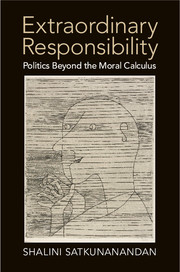Book contents
Bibliography
Published online by Cambridge University Press: 05 October 2015
Summary

- Type
- Chapter
- Information
- Extraordinary ResponsibilityPolitics beyond the Moral Calculus, pp. 235 - 246Publisher: Cambridge University PressPrint publication year: 2015



